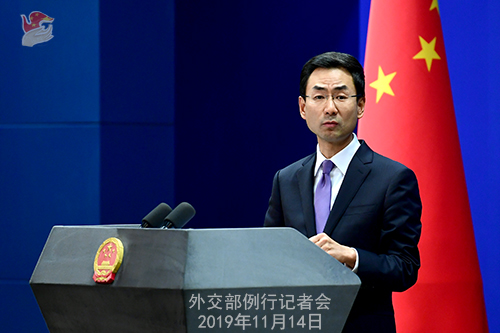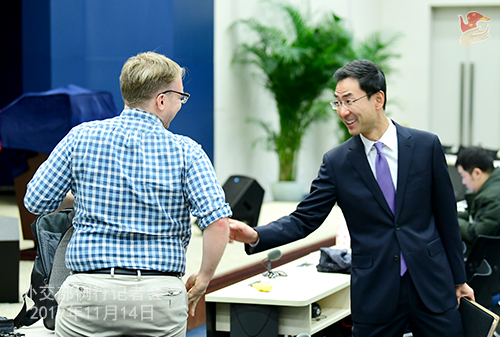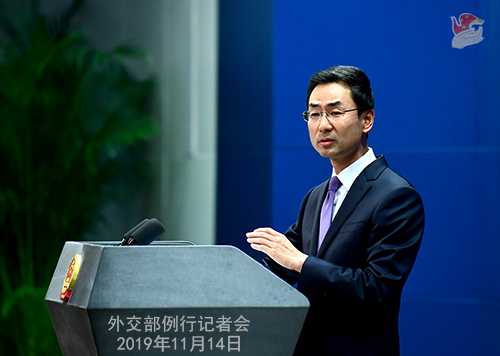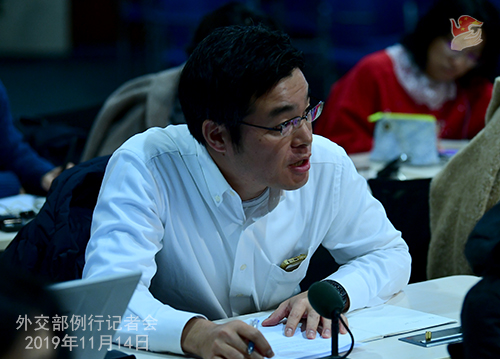| Foreign Ministry Spokesperson Geng Shuang's Regular Press Conference on November 14, 2019 |
| 2019-11-14 17:57 |
|
Q: The Australian government announced new guidelines yesterday to guard its universities against foreign interference. Are you concerned that this could affect China's academic collaboration in that country considering the recent discussion in Australia about Chinese influence? A: The Australian government's adoption of relevant education policies is the country's internal affair, which we don't comment on. It is our hope that the Australian side will adhere to the principle of fairness, transparency and non-discrimination, and ensure equal treatment in conducting external education cooperation. I would also like to point out that the long-term cooperative relations between China and Australia in the education sector have greatly facilitated student exchange between the two countries, and contributed greatly to our peoples' mutual understanding. The so-called Chinese "infiltration" into Australian higher learning institutions is pure hearsay. We have repeatedly responded to that at our press conferences. We hope the relevant side could view bilateral exchange from an objective and rational perspective and work to enhance China-Australia friendship and mutual trust instead of politicizing normal exchange programs. Q: People familiar with the matter said that earlier this year, suspected Chinese hackers broke into an industry group in the United States called the National Association of Manufacturers, which has helped to shape some of the government's trade policies. Do you have a comment on these allegations? A: I note the report. As we can see, many vague and ambiguous words like "suspected" and "suspicious" are used in the report, a clear indicator that the allegation is nothing but fabrications with ulterior motives. I would like to stress that China is a staunch defender of cyber security. We firmly oppose and fight all forms of cyber attacks or cyber theft of secrets according to law. We urge relevant sides to stop smearing China with cyber security issues. Q: The United States and the ROK plan to hold military drills in mid-November. Last night, the DPRK warned that the US will face a greater threat and harsh suffering if it goes ahead with the scheduled drills. What is China's position on this situation? A: We note the developments. Dialogue is the only viable way to achieve political settlement of the Korean Peninsula issue. We call on all parties to cherish the hard-won momentum for dialogue and amelioration, stay committed to dialogue and consultation, show flexibility, enhance mutual trust and work constructively towards denuclearization and enduring peace on the Peninsula.
Q: The UN Security Council resolutions require repatriation of all overseas DPRK workers by December 22. If the sanction is enforced strictly, Pyongyang would likely react sharply. China is the DPRK's closest partner. Does the Chinese government implement the sanction as scheduled? A: As we have stated repeatedly when responding to similar questions, China earnestly implements UN Security Council resolutions and fulfills its international obligations. We will handle relevant issues in accordance with provisions of relevant resolutions. Q: The European Union along with France, Germany and Britain on Monday urged Iran to continue to abide by the 2015 nuclear agreement or face action which could include reimposing sanctions. Would China support reimposing sanctions? And has China discussed this specific issue with Russia or the European signatories to the agreement? A: To my knowledge, in the joint statement issued on November 11, the European side didn't state they would reimpose sanctions on Iran. Besides, it is China's consistent position that the wanton use or threat of sanctions is neither constructive nor helpful for any settlement. Dialogue and negotiation is the real way out. I responded to many questions relating to Iran recently. I would reiterate that it is China's consistent belief that the US unilateral withdrawal from the JCPOA and maximum pressure campaign against Iran are the root cause of the current crisis. The US should quit such wrong behavior to make room for diplomatic efforts and create conditions for de-escalation. In the meantime, parties including the European side and Iran should exercise restraint, remain committed to full and effective implementation of the agreement, resolve differences within the JCPOA framework and work for the political and diplomatic settlement of the Iranian nuclear issue. As to whether China is in contact with Russia and the European side, I can tell you that China stays in close communication with them on the Iranian nuclear issue.
Q: Was there a deputy-level phone call last night D.C. time on sticking points in trade talks? If so, what was discussed? A: Your colleague is at the press conference in the Commerce Ministry now, right? Like we repeatedly said, you may need to ask the Commerce Ministry for details of the China-US trade talks. Q: There's a meeting in Brussels next week on the issue of rare earths. Do you have any comment on this meeting, which is probably going to focus very strongly on China's dominance over rare earths, a concern in Western countries? A: I haven't heard about this meeting you mentioned and will need to ask for more information. I can only give you a principled response now. In today's world of globalization where industrial chains are intricately entwined, attempts to dominate or monopolize a certain field or market and artificially sever or exclude a specific link will only lead to dead ends. China has the world's largest reserve of rare earths and is the biggest producer of it, which makes China important in the global rare-earth industrial chain. Following the principle of openness, collaboration and shared benefits, China has been developing its domestic rare-earth industry and stands ready to meet legitimate needs of other countries with rare-earth resources and products, thus contributing to promoting economic growth at home and abroad.
|
 |
|



